-
Wednesday, 3 May 2023 Cineteca Madrid (Matadero), Sala Azcona
Narimane Mari. Holy Days
France and Algeria, 2019, colour, original version without dialogue, DA, 40’
Tickets— With a presentation by Narimane Mari and screening with live music from Cosmic Neman, Quentin Rollet and Lori Schenberg
In this film the narration is at once elementary and complex: a man digs his own grave to bury himself in but in the act animals and elements try to stop him. Life and death, contained within a hypnotic, circular visual poem with mystical influences, reminds us that humanity was never at the centre of nature and that other gazes are possible. Mari explores a post-humanist cinema plagued with uncertainty and mystery, one which dies and is reborn elemental and dispossessed, reincarnated in free thinking between images, beings and situations which, rather than a philosophy of images, is a new way of sensing.
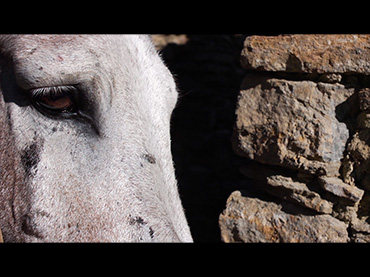
-
Thursday, 4 May 2023 – 7pm / Second session: Wednesday, 10 May Museo Reina Sofía, Sabatini Building, Auditorium
Narimane Mari. Loubia hamra [Bloody Beans]
Algeria and France, 2013, colour, original version in Arabic and French with Spanish subtitles, DA, 77’
Tickets— With a presentation by Narimane Mari and live music by Cosmic Neman, Lori Schenberg and Quentin Rollet in the first session
Narimane Mari’s first feature, awarded the Jury Prize at the Marseille International Film Festival (FID Marseille) and the Copenhagen International Documentary Film Festival (CPH:DOX). This original film on the Algerian War of Independence, made on its fiftieth anniversary, invokes the real from fiction: a group of children play on the beach while they express dissatisfaction over their diet based solely on red beans and the flatulence it causes. As the film progresses, with no historical setting and only through language, we find ourselves at the height of French occupation in 1960s Algeria. Unable to remain indifferent to the violence of the occupiers, the group attack the house of a vicious colonist wearing a pig mask. In disguise, they desecrate a Christian cemetery and kidnap one of the French soldiers. Once on the beach, they subject him to the torture of eating the red beans they have been forced to consume since the occupation. A playful and political fantasy with a spirit akin to Jean Vigo’s Zéro de conduite (Zero for Conduct, 1933), and with wonderful acting performances by the child protagonists.
![Narimane Mari, Loubia hamra [Bloody Beans], film, 2013 Narimane Mari, Loubia hamra [Bloody Beans], film, 2013](https://recursos.museoreinasofia.es/legacy_programs/nari2.jpg)
-
Friday, 5 May 2023 – 7pm / Second session: Thursday, 11 May Museo Reina Sofía, Sabatini Building, Auditorium
Narimane Mari. On a eu la journée bonsoir (We Had the Day Bonsoir)
France, 2022, colour, original version in French with Spanish subtitles, DA, 63’
Tickets— With a presentation by and talk with Narimane Mari in the first session
Mari´s personal story of her relationship with Michel Hass (1934–2019), a poet, performer, abstract painter and the film-maker’s late partner. The film is a soulful portrait sketched from the images of their life together and interspersed with fragments of Hass’s work, while the editing works as a concise declaration of a beautiful and poignant loving memory. Film as experience serves as the basis for intimacy treated poetically, where illness does not overshadow the person, but instead helps us understand the experience of life and death in their length and breadth.
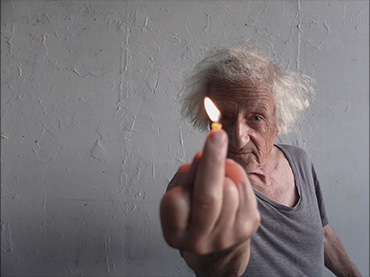
-
Saturday, 6 May 2023 – 7pm / Second session: Friday, 12 May 2023 Museo Reina Sofía, Sabatini Building, Auditorium
Narimane Mari. S'il etait une fois (If Once Upon a Time)
France, 2023, colour, without dialogue, original version in French and English, 20’. International premier
AdmissionNarimane Mari. Holy DaysFrance and Algeria, 2019, colour, original version without dialogue, DA, 40The international premiere of the film-maker’s most recent work, made in cooperation with Emma Bontron, Lucie Taffin, Tigran Avédikian, Antonin Boischot, Antoine Morin, Olivier Boischot and with the special collaboration of Gertrude Stein, Ghérasim Luca, Daniel Johnston and Alan Vega, among others. The assembly and editing in this film are all-important because it is about, as Mari puts it, “the history of the repetitions of our repetitions. A staging as a never-ending exercise is also a never-ending story of how much we love one another because we gaze at one another. With film everything can be shown that little bit closer”. The premiere will be followed by an accordion concert by Lucie Taffin and a fresh screening of Holy Days.
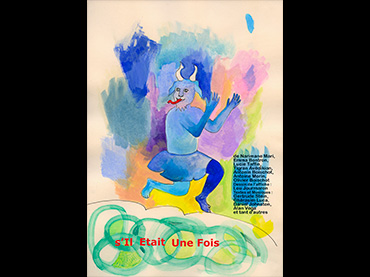
-
Sunday, 7 May 2023 – 12pm / Second session: Saturday, 13 May 2023 Museo Reina Sofía, Sabatini Building, Auditorium
Narimane Mari. Le fort des fous (Madmen’s Fort)
Germany, Algeria, France, Greece, Qatar and Switzerland, 2017, colour, original version in Arabic, Greek, English and French, with Spanish subtitles, DA, 140’
TicketsProduced by documenta 14, this contemporary epic poem on the history and tenacity of colonialism, ways of living freely in a community and the cracks inside the system of consumption forges a socio-political essay structured in three acts. The first act shows us the military exercises and teachings in the military barracks of former French President Charles de Gaulle in Algeria, whereby soldiers follow a drill to out-of-sync voiceovers and texts extracted from late nineteenth-century colonial literature. In the second act, a community wanders around the Greek island of Cythera in an alternative future and between activities of communal living, exploring how to live together. The third observes conversations between anti-system militants and activists Heval Mazlum and Annie Paparousou in the Prosfygika squat. A fragmentary experience which explores the epistemology of displacement while it practices renewed citizen identities.
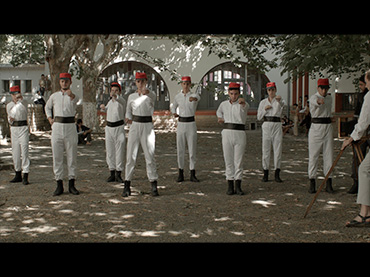
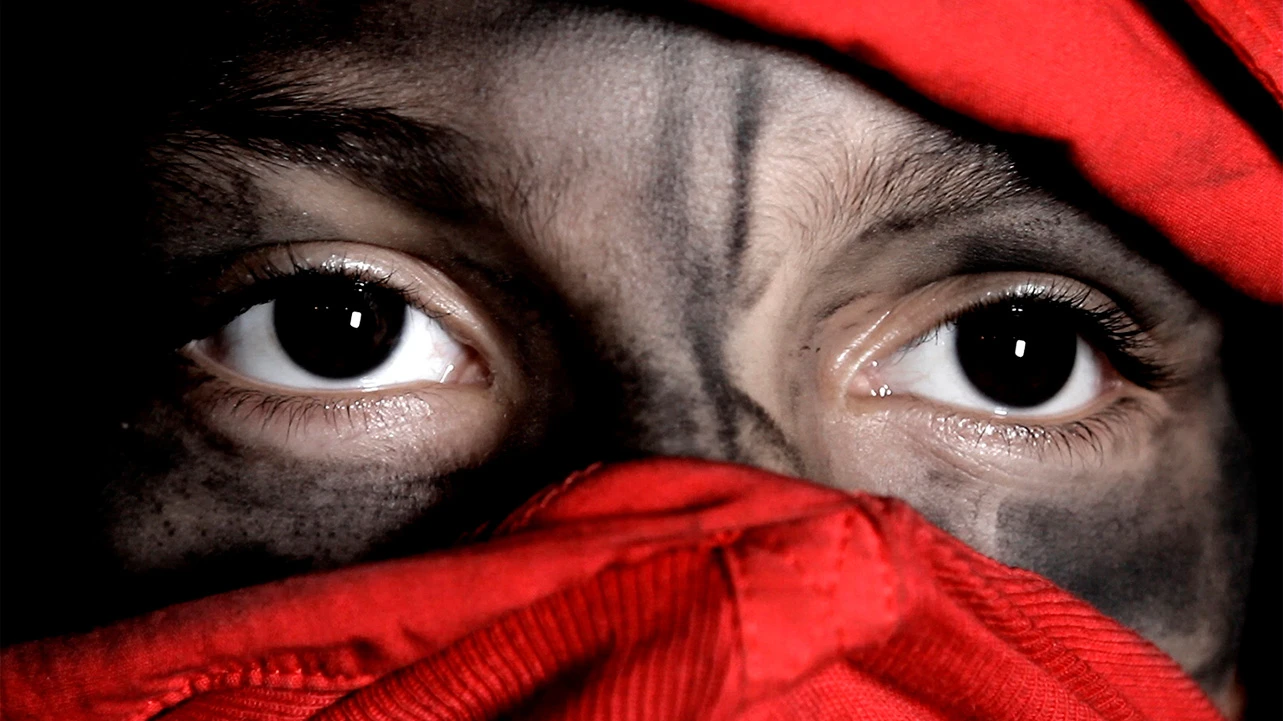
Held on 03, 04, 05, 06, 07, 10, 11, 12, 13 May 2023
Museo Reina Sofía and Documenta Madrid bring into focus Narimane Mari (Algeria, 1969) in this film series, which includes the international premiere of her latest film S'il etait une fois (If Once Upon a Time, 2023), three live music sessions, presentations of different films and a conversation with the artist and film-maker. It constitutes the first international retrospective on Mari after her participation in prestigious film festivals like Locarno, Toronto (TIFF), New York (NYFF), Viennale, Mar del Plata and Marseille (FID), and an array of international art museums and institutions, for instance The Museum of Modern Art (MoMA) in New York, Centre Pompidou and documenta 14.
Mari’s films are distinguished by how they transcend the borders of documentary, experimental cinema and fiction, exploring our perception and film’s capacity to transform reality. They move through ideologies of power, such as European colonialism, Le fort des fous (Madmen’s Fort, 2017) and Loubia hamra (Bloody Beans, 2013), and personal stories, for instance the loss of a loved one in On a eu la journée bonsoir (We Had the Day Bonsoir, 2022). By and large, her work gives form to a type of cinematography that responds to an open process stretching beyond narrative stereotypes and granting us access to new forms of knowledge.
The title to the retrospective, Mejor ser que obedecer (It Is Better to Be than to Obey), is a verse by Antonin Artaud that Mari employs as a slogan in the film Loubia hamra, and which, equally, describes the aspiration for formal freedom and the search for new states of consciousness in her work as a whole. Thus, Mari shapes a filmic practice more akin to alternative theatre as she looks to analyse film’s capacity to produce meanings. Narration is always elliptical, the protagonists are non-professional actors who work with no script and the camera moves freely beyond hierarchies and repetitions. The music and soundscapes become central in this approach: on one side, they contribute to creating states of trance and hypnosis and, on the other, they introduce emotions that connect with invisible aspects of narration.
Mari belongs to a wave of artists who endeavour to rethink film not as representation, but as an event, believing in its capacity to reconnect our experience with images. In essence, as the film-maker puts it: “[…] I’ve only had one desire, to take a rest from the kind of cinema whose rules prevent discoveries. But also to continue my work on languages by going even further to find possible narratives through other means of perception”.
Curator
Chema González
Organised by
Museo Reina Sofía and Documenta Madrid (20th International Film Festival
Más actividades

Aesthetics of Peace and Desertion Tactics
8 October 2025 – 24 June 2026
The study group Aesthetics of Peace and Tactics of Desertion: Prefiguring New Pacifisms and Forms of Transitional Justice proposes a rethinking—through both a theoretical-critical and historical-artistic lens—of the intricate network of concepts and practices operating under the notion of pacifism. A term not without contestation and critical tension, pacifism gathers under its name a multiplicity of practices—from anti-militarism and anti-war movements to non-violence activism—while simultaneously opening urgent debates around violence, justice, reparation, and desertion. Here, pacifism is not conceived as a moral doctrine, but as an active form of ethical and political resistance capable of generating aesthetic languages and new positions of social imagination.
Through collective study, the group seeks to update critical debates surrounding the use of violence and non-violence, as well as to explore the conflict of their representation at the core of visual cultures. In a present marked by rearmament, war, genocide, and the collapse of the social contract, this group aims to equip itself with tools to, on one hand, map genealogies and aesthetics of peace—within and beyond the Spanish context—and, on the other, analyze strategies of pacification that have served to neutralize the critical power of peace struggles. Transitional and anti-punitive justice proposals will also be addressed, alongside their intersections with artistic, visual, and cinematic practices. This includes examining historical examples of tribunals and paralegal activisms initiated by artists, and projects where gestures, imaginaries, and vocabularies tied to justice, reparation, memory, and mourning are developed.
It is also crucial to note that the study programme is grounded in ongoing reflection around tactics and concepts drawn, among others, from contemporary and radical Black thought—such as flight, exodus, abolitionism, desertion, and refusal. In other words, strategies and ideas that articulate ways of withdrawing from the mandates of institutions or violent paradigms that must be abandoned or dismantled. From feminist, internationalist, and decolonial perspectives, these concepts have nourished cultural coalitions and positions whose recovery today is urgent in order to prefigure a new pacifism: generative, transformative, and radical.
Aesthetics of Peace and Tactics of Desertion, developed and led by the Museo Reina Sofía’s Studies Management, unfolds through biweekly sessions from October to June. These sessions alternate between theoretical discussions, screenings, work with artworks and archival materials from the Museo’s Collection, reading workshops, and public sessions. The group is structured around sustained methodologies of study, close reading, and collective discussion of thinkers such as Judith Butler, Elsa Dorlin, Juan Albarrán, Rita Segato, Sven Lütticken, Ruth Wilson Gilmore, and Franco “Bifo” Berardi; historical episodes such as the anti-nuclear and anti-arms race movement in Spain; and the work of artists and activists including Rojava Film Commune, Manuel Correa and the Oficina de Investigación Documental (Office for Documentary Investigation), and Jonas Staal, among other initial cases that will expand as the group progresses.

Institutional Decentralisation
Thursday, 21 May 2026 – 5:30pm
This series is organised by equipoMotor, a group of teenagers, young people and older people who have participated in the Museo Reina Sofía’s previous community education projects, and is structured around four themed blocks that pivot on the monstrous.
This fourth and final session centres on films that take the museum away from its axis and make it gaze from the edges. Pieces that work with that which is normally left out: peripheral territories, unpolished aesthetics, clumsy gestures full of intent. Instead of possessing an institutional lustre, here they are rough, precarious and strange in appearance, legitimate forms of making and showing culture. The idea is to think about what happens when central authority is displaced, when the ugly and the uncomfortable are not hidden, when they are recognised as part of the commons. Film that does not seek to be to one’s liking, but to open space and allow other ways of seeing and inhabiting the museum to enter stage.

Intergenerationality
Thursday, 9 April 2026 – 5:30pm
This series is organised by equipoMotor, a group of teenagers, young people and older people who have participated in the Museo Reina Sofía’s previous community education projects, and is structured around four themed blocks that pivot on the monstrous.
The third session gazes at film as a place from which to dismantle the idea of one sole history and one sole time. From a decolonial and queer perspective, it explores films which break the straight line of past-present-future, which mix memories, slow progress and leave space for rhythms which customarily make no room for official accounts. Here the images open cracks through which bodies, voices and affects appear, disrupting archive and questioning who narrates, and from where and for whom. The proposal is at once simple and ambitious: use film to imagine other modes of remembering, belonging and projecting futures we have not yet been able to live.

Remedios Zafra
Thursday March 19, 2026 - 19:00 h
The José Luis Brea Chair, dedicated to reflecting on the image and the epistemology of visuality in contemporary culture, opens its program with an inaugural lecture by essayist and thinker Remedios Zafra.
“That the contemporary antifeminist upsurge is constructed as an anti-intellectual drive is no coincidence; the two feed into one another. To advance a reactionary discourse that defends inequality, it is necessary to challenge gender studies and gender-equality policies, but also to devalue the very foundations of knowledge in which these have been most intensely developed over recent decades—while also undermining their institutional support: universities, art and research centers, and academic culture.
Feminism has been deeply linked to the affirmation of the most committed humanist thought. Periods of enlightenment and moments of transition toward more just social forms—sustained by education—have been when feminist demands have emerged most strongly. Awareness and achievements in equality increase when education plays a leading social role; thus, devaluing intellectual work also contributes to harming feminism, and vice versa, insofar as the bond between knowledge and feminism is not only conceptual and historical, but also intimate and political.
Today, antifeminism is used globally as the symbolic adhesive of far-right movements, in parallel with the devaluation of forms of knowledge emerging from the university and from science—mistreated by hoaxes and disinformation on social networks and through the spectacularization of life mediated by screens. These are consequences bound up with the primacy of a scopic value that for some time has been denigrating thought and positioning what is most seen as what is most valuable within the normalized mediation of technology. This inertia coexists with techno-libertarian proclamations that reactivate a patriarchy that uses the resentment of many men as a seductive and cohesive force to preserve and inflame privileges in the new world as techno-scenario.
This lecture will address this epochal context, delving into the synchronicity of these upsurges through an additional parallel between forms of patriarchal domination and techno-labor domination. A parallel in which feminism and intellectual work are both being harmed, while also sending signals that in both lie emancipatory responses to today’s reactionary turns and the neutralization of critique. This consonance would also speak to how the perverse patriarchal basis that turns women into sustainers of their own subordination finds its equivalent in the encouraged self-exploitation of cultural workers; in the legitimation of affective capital and symbolic capital as sufficient forms of payment; in the blurring of boundaries between life and work and in domestic isolation; or in the pressure to please and comply as an extended patriarchal form—today linked to the feigned enthusiasm of precarious workers, but also to technological adulation. In response to possible resistance and intellectual action, patriarchy has associated feminists with a future foretold as unhappy for them, equating “thought and consciousness” with unhappiness—where these have in fact been (and continue to be) levers of autonomy and emancipation.”
— Remedios Zafra

27th Contemporary Art Conservation Conference
Wednesday, 4, and Thursday, 5 March 2026
The 27th Contemporary Art Conservation Conference, organised by the Museo Reina Sofía’s Department of Conservation and Restoration, with the sponsorship of the Mapfre Foundation, is held on 4 and 5 March 2026. This international encounter sets out to share and debate experience and research, open new channels of study and reflect on conservation and the professional practice of restorers.
This edition will be held with in-person and online attendance formats, occurring simultaneously, via twenty-minute interventions followed by a five-minute Q&A.